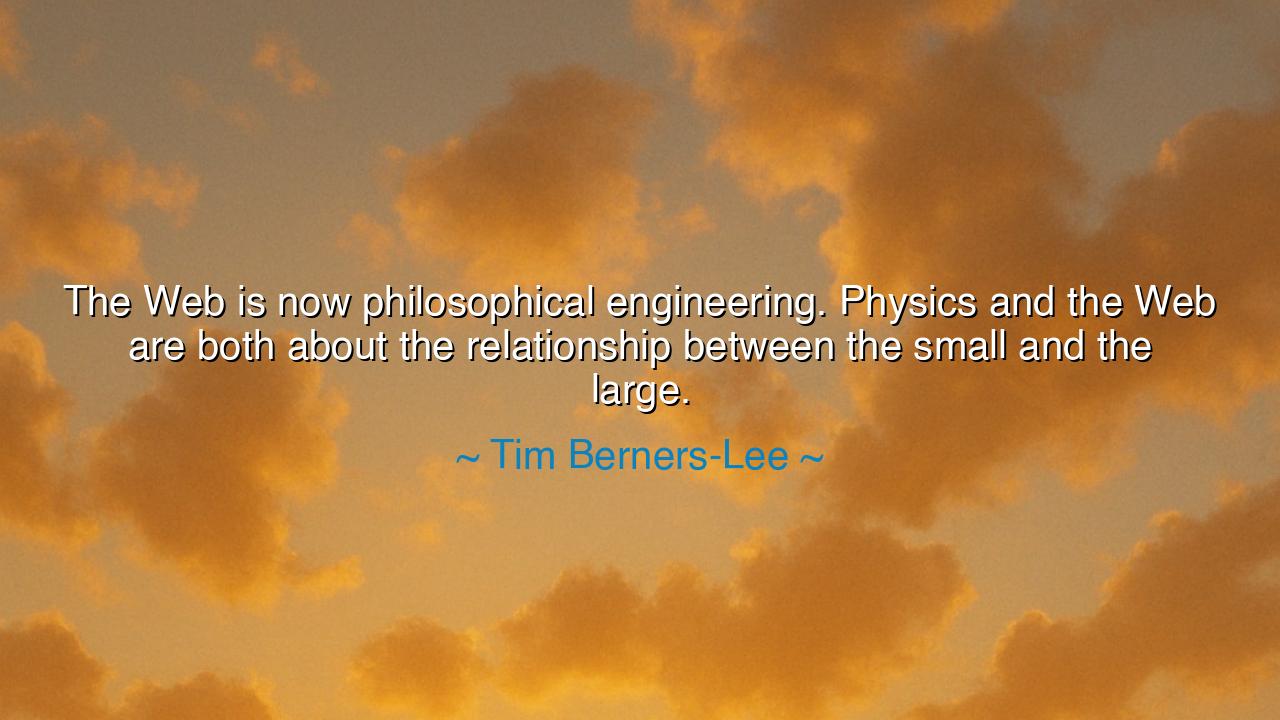
The Web is now philosophical engineering. Physics and the Web
The Web is now philosophical engineering. Physics and the Web are both about the relationship between the small and the large.






When Tim Berners-Lee proclaims, “The Web is now philosophical engineering. Physics and the Web are both about the relationship between the small and the large,” he speaks as the architect of a new world. His words remind us that technology is not mere machinery, but an idea that shapes how humanity thinks, lives, and connects. Just as physics seeks to understand the cosmos through its smallest particles and its vastest systems, so too does the Web bind together the individual and the collective, the single voice and the chorus of humanity.
The origin of this insight lies in Berners-Lee’s own creation of the World Wide Web, a system first conceived to share knowledge among scientists but which grew to encircle the earth. Over time, he saw that it had become more than a tool — it was a living fabric of thought and exchange, where ideas flowed like rivers into oceans. To call it philosophical engineering is to acknowledge that behind its wires and codes lies a vision of human unity, of meaning shaped by connection.
The relationship between the small and the large is the essence of both physics and the Web. In the atom lies the universe; in the single webpage lies the collective library of mankind. A lone message can stir nations, just as the smallest particle contains forces that shape the stars. Berners-Lee reminds us that greatness is not born of scale alone, but of the interplay between the minute and the vast, the one and the many.
His words also serve as a warning and a call. For if the Web is indeed philosophical, then its builders are not only engineers but also stewards of thought and morality. Every line of code, every design of connection, carries within it the power to shape human destiny. As with physics, the truths discovered and the forces unleashed must be guided by wisdom, lest they consume rather than enlighten.
Let the generations to come remember: the Web is not merely a net of machines, but a mirror of the soul of humanity. Its power lies in the sacred relationship between individual voices and the vast chorus of the collective. Tim Berners-Lee’s words endure as both prophecy and counsel — that the world he wove is not only technical, but philosophical, and its meaning depends on how wisely it is tended.






HTHo Hoai Thuong
The comparison between physics and the Web is compelling, especially the idea that both deal with the relationship between the small and the large. It makes me think about how the smallest piece of data can lead to massive shifts in information and communication. How does this affect the way we approach online privacy and security? Could Berners-Lee’s philosophy help us better understand our role in the Web’s intricate system and how we interact with it?
ANNgoc Anh Nguyen
This quote opens up an interesting way to view the Web. By calling it 'philosophical engineering,' Berners-Lee suggests there’s more than just logic and structure at play — there’s something deeper, almost intangible, connecting everything. But how does this idea play into our everyday experience of the Web? Can it ever truly live up to this philosophical concept, or is it simply a powerful tool that we use without thinking about its larger implications?
TTmanh thang tran
Tim Berners-Lee's description of the Web as 'philosophical engineering' made me think about the deeper meaning of the internet. It’s more than just a tool; it’s a vast network of interconnected ideas and possibilities. But do we, as users, fully understand the consequences of those small interactions? Does this philosophy reflect a responsibility to consider the larger impact of our online actions, or are we still just focusing on convenience?
NHNguyen Huy
I love this analogy, particularly the connection Berners-Lee makes between physics and the Web. It really brings out the beauty of both systems — how something so intricate can have a huge influence on a larger scale. But I wonder, can the Web truly be considered 'philosophical engineering,' or is that just an overstatement? What makes the Web different from other forms of engineering that aren’t as 'philosophical'?
NPNhat Pahm
This is such a fascinating perspective from Tim Berners-Lee. To think of the Web as 'philosophical engineering' really makes you appreciate the complexity of how it’s structured and how it connects everything. The idea that both the Web and physics are about the relationship between the small and the large resonates deeply — how tiny actions online can have massive impacts. Do you think that comparison also applies to how we, as individuals, interact with the Web on a daily basis?